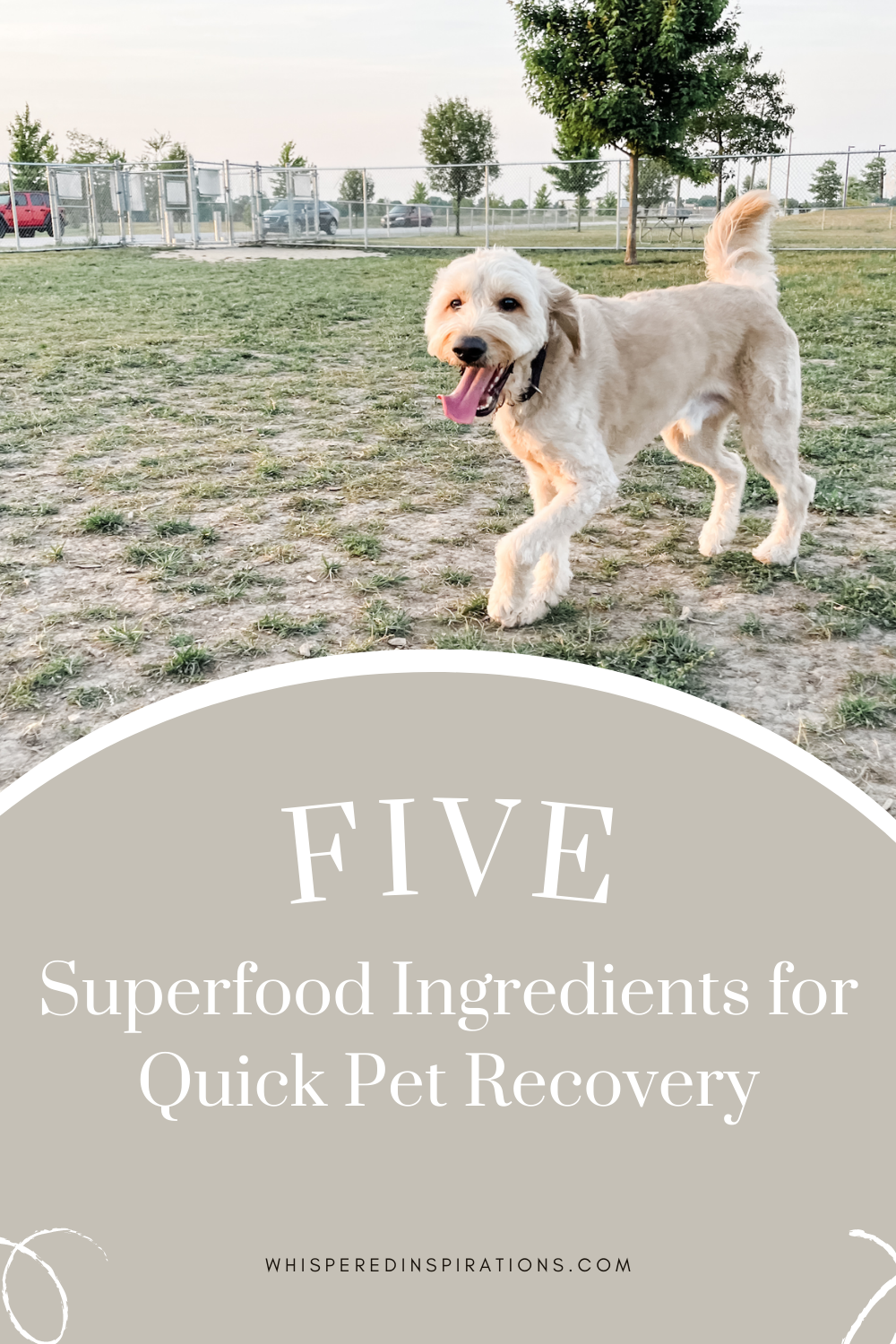5 Superfood Ingredients for Quick Pet Recovery

Superfood Ingredients for Quick Pet Recovery
As a dedicated pet parent, nothing is more distressing than watching your beloved furry friend struggle with an illness or recover from an injury or surgery.
It’s as if their pleading eyes are constantly asking you, “What can I do to feel better?”
Fortunately, as a pet owner, there is a lot you can do to facilitate your pet’s journey to recovery.
Besides providing a comfortable recovery space, administering the necessary medication, and showering them with love and affection.
Diet is another important aspect of your pet’s recovery process that you have to take seriously.
Just as humans need a nutrient-dense diet to recover from any illness or injury, our pets also need the right foods to accelerate their healing process.
But what are these “right foods”? We might be familiar with the nutritional value of dog food, but how about other kinds of food?
You might wonder. Well, that’s exactly what we’re about to dive into in this blog post.
Here are five superfoods your pet needs in their diet for a fast and efficient, quick pet recovery.
1.
Blueberries
The real magic of blueberries lies in their abundant antioxidant properties. These properties help fight against free radicals by preventing or slowing down the damage they cause to body cells.
They act as a sort of bodyguard for your pet’s body, preventing harmful elements from wreaking havoc.
In the case of an injured pet, whether it’s an internal or external wound, oxidative stress can slow down the healing process.
Including antioxidant-rich foods like blueberries in your pet’s diet can help combat this oxidative stress and promote faster recovery.
But that’s not all.
Blueberries also come loaded with Vitamin C and Vitamin K, contributing to your pet’s overall well-being.
Vitamin C plays a critical role in collagen synthesis, a protein vital for wound healing, while Vitamin K aids in blood clotting, preventing excessive bleeding in cases of injury.
Adding these small but mighty fruits to your pet’s diet could be a game-changer.
They can be incorporated into meals, used as a topping, or even served as a low-calorie treat.
However, moderation is key. While blueberries are beneficial, excessive consumption could lead to digestive upset, and you don’t want that for your pet.
2.
Carrots
Crunchy, sweet, and bursting with flavor, carrots are a hit with most pets. Beyond taste, carrots offer a wealth of beta-carotene, a powerful antioxidant that gets converted into Vitamin A in your pet’s body.
This vitamin is a multi-tasker with a range of benefits that are particularly advantageous for injured or recovering pets.
One of the critical roles of Vitamin A involves the maintenance and repair of body tissues.
In situations where your pet has undergone surgery, like TPLO surgery, for instance, an increased intake of Vitamin A can aid the healing process by promoting cell growth and development.
Carrots also contain a wealth of other nutrients like Vitamin C, Vitamin K, and potassium.
Like the vitamins found in blueberries, Vitamin C supports collagen synthesis, while Vitamin K boosts your pet’s blood clotting abilities.
Potassium, on the other hand, supports heart and muscle function, promoting overall well-being.
The beauty of carrots is their versatility. You can offer them raw as a crunchy treat, lightly steam them to make them easier to chew, or puree them and mix them into your pet’s meal.
Your options are limitless!
3.
Salmon
Inflammation is the body’s natural response to injury or illness. However, persistent inflammation can delay the healing process and lead to additional health issues.
Omega-3 fatty acids, particularly EPA (eicosapentaenoic acid) and DHA (docosahexaenoic acid), found in abundance in salmon, can significantly decrease inflammation, aiding your pet’s recovery.
Plus, Omega-3 fatty acids are known to promote heart health, support brain function, improve joint health, and even boost mood.
All of which can be particularly beneficial for a pet trying to recover.
Salmon is also an excellent source of high-quality protein, which is integral in repairing body tissues and maintaining muscle mass during periods of rest or inactivity, and it contains an array of other essential nutrients like B vitamins, Vitamin D, and selenium.
However, while salmon offers multiple health benefits for your pet, it’s crucial to prepare it correctly.
Always serve it cooked (preferably steamed or baked), and ensure all bones are removed to prevent any choking hazards.
You are on your way to quick pet recovery.
4.
Sweet Potatoes
Sweet potatoes are undoubtedly one of nature’s most delightful creations, offering not just a sweet, palate-pleasing flavor but also an impressive nutrition profile.
Primarily, sweet potatoes are an excellent source of dietary fiber, which is crucial for your pet’s digestive health.
Recovering pets often experience reduced activity levels, and this sedentary lifestyle can sometimes lead to digestive issues.
The fiber in sweet potatoes helps regulate bowel movements and supports overall gut health. Plus, they are packed with beta-carotene, a precursor to Vitamin A.
It plays an integral role in skin health, vision, and immune function, all critical elements in your pet’s recovery process.
They are also rich in Vitamin C, which is a potent antioxidant and helps in collagen formation, a protein responsible for wound healing.
The best way to prepare sweet potatoes for your pet is by cooking them thoroughly—either by boiling, baking, or steaming—until they’re soft enough to be easily mashed.
5.
Bone Broth
This “healing elixir” has gained popularity among pet owners in recent years, and for good reason.
It’s easy to digest, hydrating, and a powerhouse of vital nutrients like glucosamine, chondroitin, and hyaluronic acid.
All essential nutrients are needed for joint health, especially in the case of senior dogs that are suffering from joint problems as a result of injuries or dogs who’ve just had TPLO surgery, making it an ideal component of their recovery diet.
You May Also Like:
- 7 Effective Tips for Grooming Your Furry Friend
- The 4 Essentials To Getting Your Yard Ready For Winter
- Keep Your House a Home with a Pet
- 6 Pet-Friendly Furniture Ideas For Your Home
The amino acids in bone broth, such as glycine and proline, support a healthy gut, liver function, and immune system.
However, before you rush to the kitchen to whip up a batch of bone broth, remember to use high-quality, preferably organic bones, and avoid adding onions, garlic, or heavy seasonings that could be harmful to your pet.
Wrapping Up
Remember, while these superfoods are fantastic supplements, they don’t replace professional veterinary care. Always consult with your vet before making any significant changes to your pet’s diet.
They can provide personalized advice tailored to your pet’s breed, age, current health condition, and recovery needs.
Do you have any other ideas to achieve quick pet recovery?
Let me know, til then—cheers m’deres!

PIN FOR LATER:

Nancy Polanco is a freelance journalist, lifestyle content creator, and editor of Whispered Inspirations. She is a proud Mom to Gabby and Michaela and partner and best friend to Darasak. Having worked as part of a health care team for almost a decade, Nancy is happy to be back to her passion. She is a contributor to the Huffington Post, TODAY’s Parents, and an Oprah Magazine Brand Ambassador.







